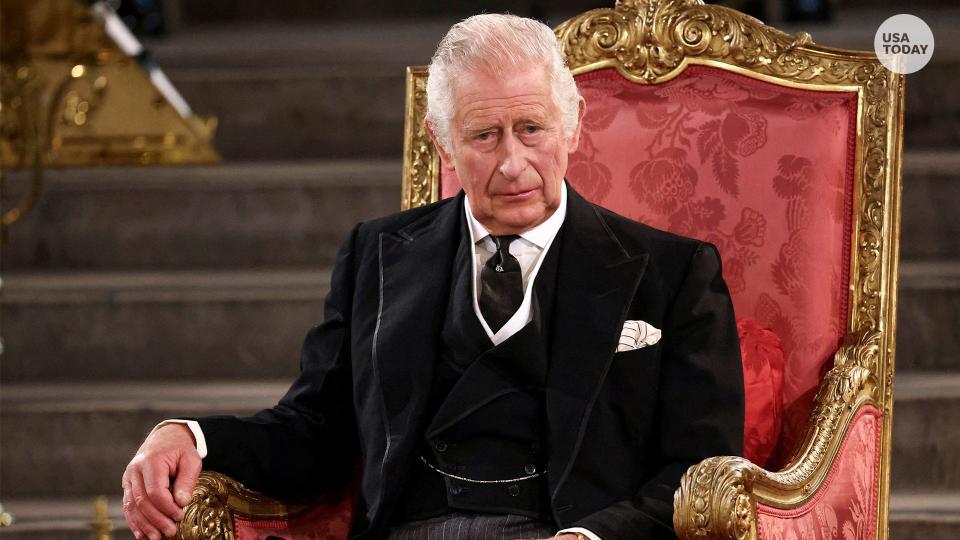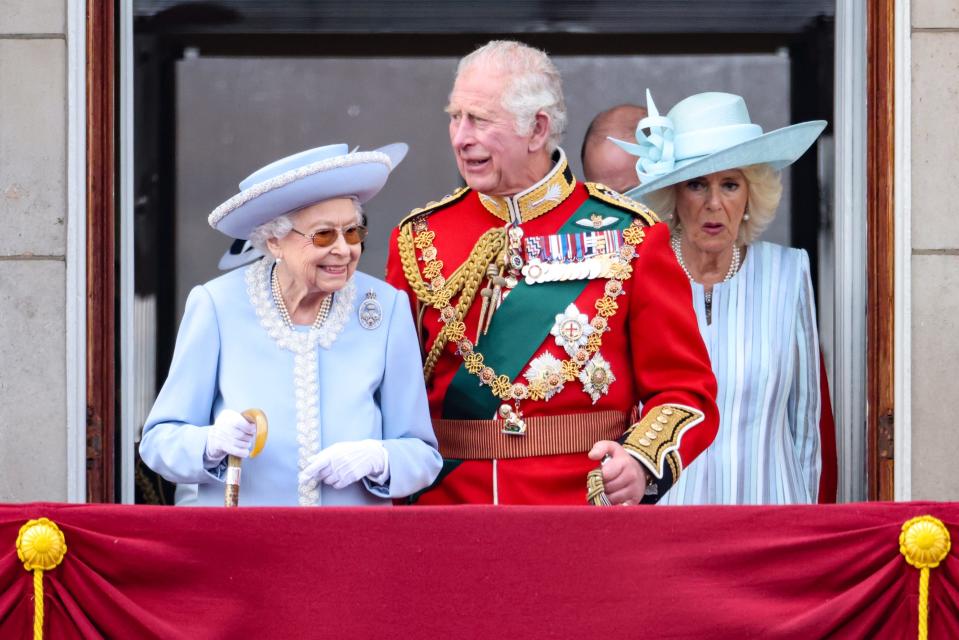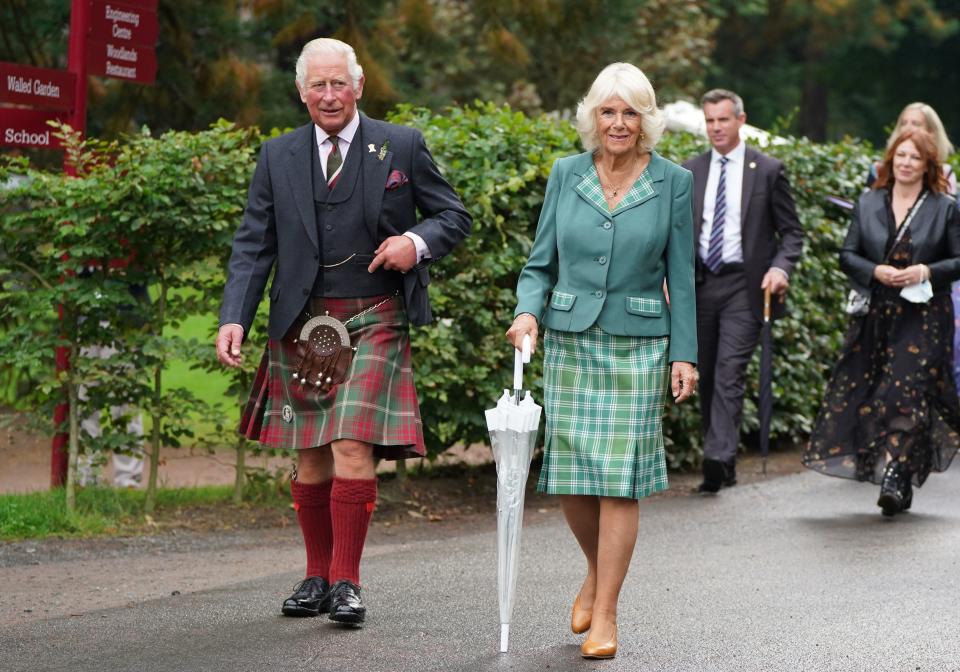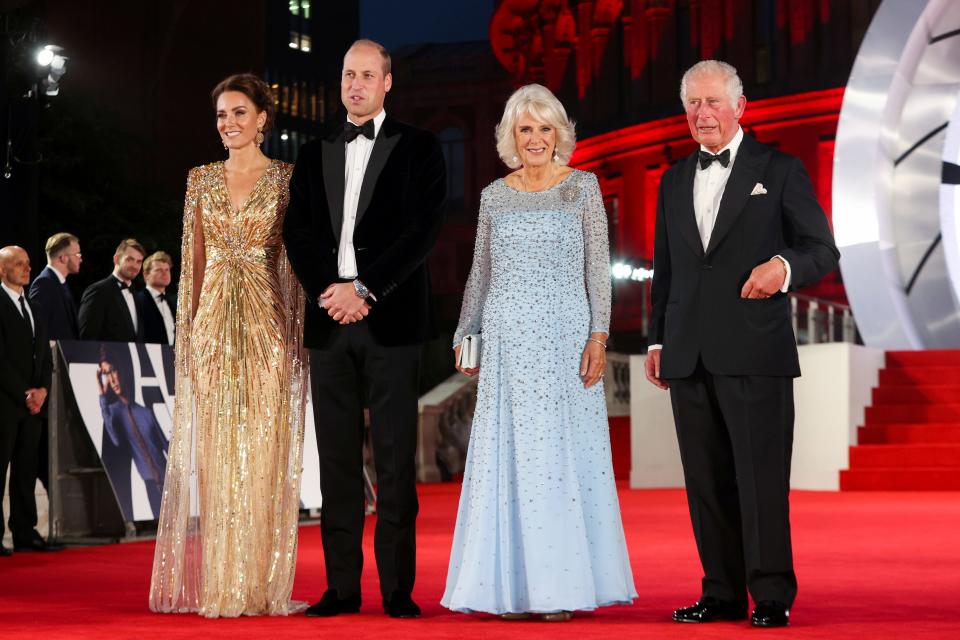Now that the funeral is over, what's next for King Charles and how will he reign?
- Oops!Something went wrong.Please try again later.
- Oops!Something went wrong.Please try again later.
- Oops!Something went wrong.Please try again later.
After 10 days of pageantry and services, Queen Elizabeth II was buried in a quiet and intimate service away from cameras in Windsor Castle, where she was reunited with her husband Prince Philip and her parents.
King Charles III and senior royal family members gathered Monday for the private interment ceremony at the King George VI memorial chapel, an annex within St. George’s Chapel. Now Charles and his family will begin seven more days of mourning for the queen in what is expected to be out of the public eye. But after that, what kind of king will emerge?
It's taken more than 70 years – the longest wait to reign in British history – for Charles to become king. At age 73, he is the oldest monarch to ever take the British throne after his mother died at 96 on Sept. 8.
He has become king in a less-than-certain time for the crown. Some former British colonies are looking to separate themselves from the crown and feel Britain hasn’t confronted the legacy of racism. Some younger Britons question the need for a monarchy at all, and Brexit has diminished some of Britain's stature and left countries questioning their need to stay connected.
The world reacts: King Charles III expresses 'greatest sadness' over mother Queen Elizabeth II's death
When is King Charles' coronation?
Charles will be crowned probably within a year. The ancient ritual of the coronation requires advance planning, although a lot of that has already been done. But there hasn't been a coronation since June 1953 when Elizabeth was crowned.
What happens next has been carefully planned out decades in advance, based on combining ancient funeral and coronation traditions with practical measures to cope with such modern realities as instant communication, traffic control, social media and the vestiges of a killer pandemic.
Charles was 4 when his mother had her coronation, a year after she became queen. Photos show a young bored little boy resting his face on his hand. What was most important was that he was there. Photos of Prince George and Princess Charlotte at their great grandmother's funeral felt similar – a reminder of the long line of the monarchy and its strength.
What kind of king will Charles be?
We can make some guesses based on what he's said and done at least since his investiture as Prince of Wales in an elaborate (and largely modern-invention ceremony) in July 1969 at Caernarfon Castle in Wales, when he was 20.
Legally, he became king from the moment of the queen's death, meaning he is head of state for the United Kingdom, Canada, Australia, New Zealand and a dozen other countries. He's also the titular head of the Church of England, head of the military and the judiciary, and a host of other royal titles and duties.
Opinion: King Charles III must do better than his mother on colonialism and reparations. Will he?

And we have a few hints from the past 10 days of mourning. Charles is much more likely than his often stone-faced mother to show emotion.
During the committal service, the crown, scepter and orb were removed from the top of the coffin. The items were placed on an altar at St. George’s Chapel, and marked the final separation of the late queen from her crown.
The new king stood by quietly during the moments of farewell and appeared somber and a bit teary-eyed before his mother’s coffin was lowered into the vault
What happens now that Queen Elizabeth II has died? From funeral plans to processions
What is Charles' legacy as Prince of Wales?
Just as the queen was the longest-serving monarch in British history, Charles has been the longest-serving Prince of Wales in history – but not just that, says his American biographer Sally Bedell Smith.
"His record as Prince of Wales, in its breadth and depth, will be his real legacy," Bedell Smith says. "He was the most innovative prince of Wales ever – he was an activist in a way no other heir to the throne ever has been."
Part of the impetus for doing all he did, including his philanthropy, his entrepreneurial initiatives, the institutions and traditions he helped to preserve, demonstrate "his wish to prove himself worthy of being king," Bedell Smith says.
"As prince of Wales, he had the freedom to do all these things, and he sometimes crossed the line of constitutional propriety, but as prince of Wales he was not bounded by it as the queen was."
Queen Elizabeth II dies at 96: King Charles III takes the throne

Charles' ratings rise in week after his mother died
A few days after the queen died, attitudes toward the king already improved, according YouGov/Times survey, from when they last surveyed in May.
Charles faces a challenge few other succeeding monarchs in British history have ever faced, says Carolyn Harris, a historian and teacher at the University of Toronto and author of "Raising Royalty: 1000 Years of Royal Parenting."
"When there is a long reign, the monarchy and the person as the monarch come to be seen as the same," Harris says. "For many people, the queen is the only monarch they've ever known, so they closely associate the monarchy with her. The challenge is to step into that role when there's been a successful monarch in that role for decades."
What happens to the other royals? King Charles III promises a new slimmed-down monarchy
What are Charles' plans?
Charles has made no secret of his desire to "slim down" the monarchy – reduce the number of working senior royals supported by taxpayers – and reduce the overall multimillion-pound annual cost of the royal show.
His many causes (organic farming, architecture and urban planning, fighting climate change, to name a few) will not be abandoned but at least initially he will be too busy with routine matters, such as weekly meetings with the prime minister and going through the multiple red boxes of government documents he must read daily, Bedell Smith predicts.
A tiny detail about the wreath that lay on the queen's coffin demonstrates the king's commitment to the earth. At the request of the king, a longtime environmentalist, the wreath was made in a sustainable way, formed in a nest of English moss and oak branches and without the use of floral foam.
King Charles III succeeds Queen Elizabeth: What to know about British royal line
Charles' interest in religions expands beyond the Church of England.
Traditionally known as the "Defender of the Faith," Charles called himself a "committed Anglican Christian" in a meeting with faith leaders Friday at Buckingham Palace. But he also embraced the faith diversity of modern Britain and promised to protect it.
"By my most profound convictions, therefore – as well as by my position as sovereign – I hold myself bound to respect those who follow other spiritual paths, as well as those who seek to live their lives in accordance with secular ideals," he said.
Camilla's new title, explained: What's the difference between queen and 'Queen Consort'?
Can Charles toe the line as a 'constitutional' king?
Most of the speculation about the new king has focused on whether Charles would violate those prohibitions by being outspoken about political and other matters of public debate in a way his mother carefully avoided.
As prince of Wales, Charles was not always as scrupulous as his mother was, says Clive Irving, a longtime British journalist (former managing editor of the Sunday Times in London) and author of "The Last Queen," a biography of Charles' mother that questions whether the monarchy can survive after her.
"She has always been neutral and apolitical, no one has caught her out on her political views and that is the difference between her and Charles – he can't help himself," says Irving.

What's the critical take on Charles?
A frank critic of Charles, Irving describes him as a "self-centered and narcissistic," having lived a coddled, entitled and privileged existence, an "archaic-looking figure" out of step with the times, and unused to being challenged.
"How can that kind of psychology possibly adapt to a completely different responsibility as head of state?" Irving says. "The magic of monarchy means something different to him, he interprets it through his own psychology."
Irving predicts that the first year of Charles' reign will see the monarchy head "over a cliff very fast" amid disillusionment with the new king. "How can he possibly share the realities of our lives if he's never lived those realities?"
However privileged his upbringing, Charles has gone out of his way to demonstrate he cares about the less fortunate, especially through his charities, such as the Prince's Trust, which he founded in 1976 to help disadvantaged youths. The trust claims to have provided support to more than 1 million youths over the years.

How to unite the commonwealth?
The queen's popularity didn't translate into the monarchy itself. Fifty-eight percent of Canadians polled by Ipsos just a few days after the queen’s death said the time has come for Canada to hold a referendum on ending its formal ties to the British throne.
It’s not just the Canadians who are rethinking their connection to the crown. The queen’s death also raises questions about the future of the Commonwealth, an association of 56 countries that include the 14 in which the British monarch remains their head of state. Calls for them to break away and form a republic are likely to spread now that the queen’s reign has ended, analysts said.
“Her absence, combined with recent developments in British politics, gives these countries certainly an opening, even perhaps an impetus, to start thinking about breaking away,” said Mark Vail, an expert on British politics and history at Wake Forest University.
The Commonwealth won't collapse tomorrow, said Sue Onslow, director of the Institute of Commonwealth Studies in London, but “the processes of change are accelerating.”
Still, leaders of several of those independent countries chafed at being under the monarch’s eye even though, personally, the queen was viewed favorably.
Last November, Barbados officially ended nearly 400 years of British rule when it removed Queen Elizabeth as its head of state and swore in its own president in a ceremony in which Prince Charles – now King Charles III – was the guest of honor.
The queen’s grandson, Prince William, and his wife, Princess Kate, were met with protests and calls for slavery reparations last spring when they embarked upon a tour of Belize, Jamaica and the Bahamas. Jamaica’s prime minister, Andrew Holness, informed the couple that his country would be moving ahead with its plans to ditch the monarchy and become a republic. Belize also signaled its intentions to break from the crown.
Just days after the queen’s death, Gaston Browne, the prime minister of Antigua and Barbuda, told Britain’s ITV News that within three years he plans to hold a referendum on his country ditching the crown and becoming a republic.
King Charles, however, doesn’t engender the same reverence as his mother. “Those are hard shoes to fill for Charles,” Vail said.
"I think the noises that have been made by certain countries (to break from the crown) are just the beginning,” Vail said.
Contributing: Michael Collins and Kim Hjelmgaard
This article originally appeared on USA TODAY: King Charles III: What's next and what kind of monarch will he be?

